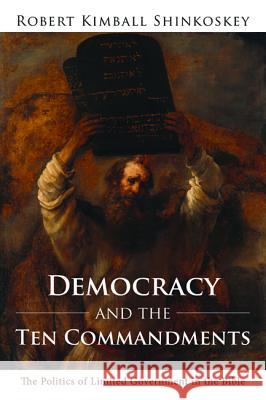Democracy and the Ten Commandments » książka
Democracy and the Ten Commandments
ISBN-13: 9781498290098 / Angielski / Miękka / 2016 / 254 str.
Democracy and the Ten Commandments
ISBN-13: 9781498290098 / Angielski / Miękka / 2016 / 254 str.
(netto: 119,13 VAT: 5%)
Najniższa cena z 30 dni: 123,70
ok. 16-18 dni roboczych.
Darmowa dostawa!
For 2,000 years Western culture has leaned heavily on the Ten Commandments for guidance in religion, ethics, and morality. The author, drawing upon modern Biblical science, demonstrates that those laws were designed for an entirely different purpose--to provide alternatives to repressive policies Israel reeled under in Egypt. The Decalogue is a political document designed to limit government intrusion into private lives. Its precepts deal with matters like political parties and intellectual freedom, central banking and taxation, occupational choice, free economy, humane working conditions, local government, right to life and international relations, land possession and inheritance, equal justice and education, and citizenship and public health. The author's interpretation necessitates a wholesale repositioning of Biblical religion. The Bible is not a book about religious worship, but is rather a book about citizen-empowered local democracy. This essay suggests a way out of the woods for an American democracy that has lost its way in a headlong veer toward heavy-handed central government. ""Robert Shinkoskey is on a mission to rescue from privatized piety what Orthodox Jewish theologian Pinchas Lapide calls the 'theopolitical dynamite' in the biblical poetic narratives. Like any classic, the Bible's epic moral vision has perpetual relevance, and Shinkoskey applies it directly to contemporary national and international politics."" --Daniel C. Maguire, Professor, Marquette University; Author, Christianity Without God: Moving Beyond the Dogmas and Retrieving the Epic Moral Narrative Robert Kimball Shinkoskey is the author of books in theology (Do My Prophets No Harm), Near East history (Biblical Captivity), the American presidency (The American Kings), and now ancient constitutional law. He is a graduate of Stanford University, a long-time state government worker in Utah, and a promoter of employee wellness programs.
For 2,000 years Western culture has leaned heavily on the Ten Commandments for guidance in religion, ethics, and morality. The author, drawing upon modern Biblical science, demonstrates that those laws were designed for an entirely different purpose--to provide alternatives to repressive policies Israel reeled under in Egypt. The Decalogue is a political document designed to limit government intrusion into private lives. Its precepts deal with matters like political parties and intellectual freedom, central banking and taxation, occupational choice, free economy, humane working conditions, local government, right to life and international relations, land possession and inheritance, equal justice and education, and citizenship and public health.The authors interpretation necessitates a wholesale repositioning of Biblical religion. The Bible is not a book about religious worship, but is rather a book about citizen-empowered local democracy. This essay suggests a way out of the woods for an American democracy that has lost its way in a headlong veer toward heavy-handed central government.""Robert Shinkoskey is on a mission to rescue from privatized piety what Orthodox Jewish theologian Pinchas Lapide calls the theopolitical dynamite in the biblical poetic narratives. Like any classic, the Bibles epic moral vision has perpetual relevance, and Shinkoskey applies it directly to contemporary national and international politics.""--Daniel C. Maguire, Professor, Marquette University; Author, Christianity Without God: Moving Beyond the Dogmas and Retrieving the Epic Moral NarrativeRobert Kimball Shinkoskey is the author of books in theology (Do My Prophets No Harm), Near East history (Biblical Captivity), the American presidency (The American Kings), and now ancient constitutional law. He is a graduate of Stanford University, a long-time state government worker in Utah, and a promoter of employee wellness programs.











